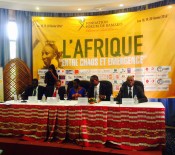Bamako – to carry through its transformation, Africa must come up with a vision built on all the different forms of capital.
From 18th to 20th February, the 16th edition of the Bamako Forum focused on the theme “Africa, between chaos and emergence”.
The Bridge Tank was among the regular attendees and what particularly caught our attention were the debates on the continent’s growth levers, with themes that we hold dear: innovative financing, training and developing human capital, and the role of the elites in envisioning the future of the African continent.
The panel discussion on “Accelerating regional integration to fuel economic growth” combined courageous analyses and innovative solutions based on the guiding principle that, to grow sustainably, Africa must take stock of its own wealth – its actual natural, human, social and technical capital – in order to craft its tools for growth.
In connection with vision, the panel moderator, Abdoulaye Diop, Mali’s Minister of Foreign Affairs and International Cooperation, reminded us of the contradiction of a rich continent inhabited by poor people and stressed that “to negotiate, we must first recognize our value”. Off the record, an entrepreneur from a neighboring country, operating in Africa and in the Middle East, agreed: “in negotiations, you never get what you deserve but what you take”. The question looming in many people’s minds haunts Africa today: how can the panel of international partners be diversified so that a balanced relationship is imposed?
The issue of how to finance the necessary projects and infrastructure was also discussed. As we see it, the Africa50 fund is now tackling this with an innovative approach. This African development bank (AfDB) initiative was presented by Amadou Kane, Senegal’s former Minister of Economy and Finance. The goal: improve project bankability and shorten the interval between the conception of a project and its financial closure –from the current average of 7 years downto 3 years. This vehicle aims “to mobilize private financing and accelerate infrastructure creation in Africa to establish a new platform for African growth.”
One important aspect of infrastructure has not eluded Samba Bathily, CEO of Solektra International: in his view, energy plays a role in growth and regional integration, and Africa has substantial solar capital. “When we build a dam, it can take 10 years to get from the study phase to the start of works, whereas with renewable energy we can get a project on the rails in 6 months…we have already tested this and managed to electrify nearly 380 locations in various countries in six months,” he assured.
He then added: “Africa must place its trust in Africans. A project that is basically profitable then meets the challenge of financial packaging; technology can be bought”, which closes the loop of a vision based on trust. Many interesting solutions that, of course, rely on the pivotal role of Africa’s human resources.

